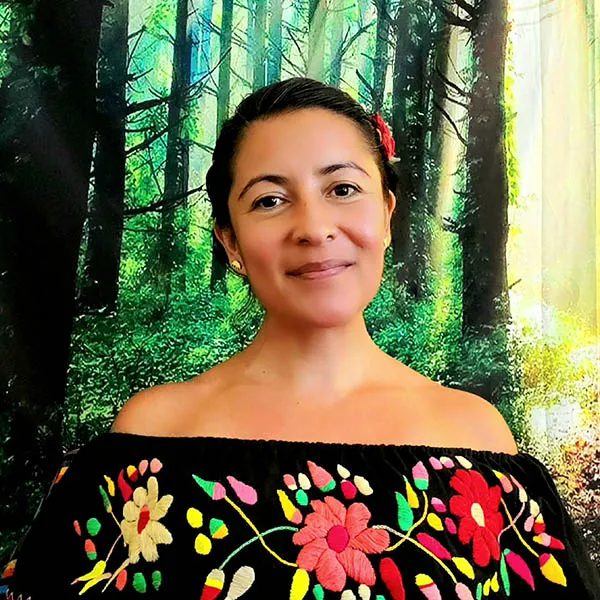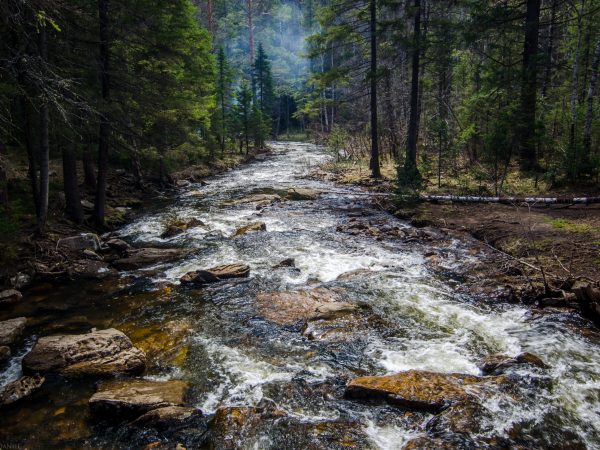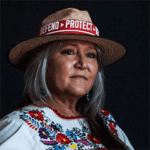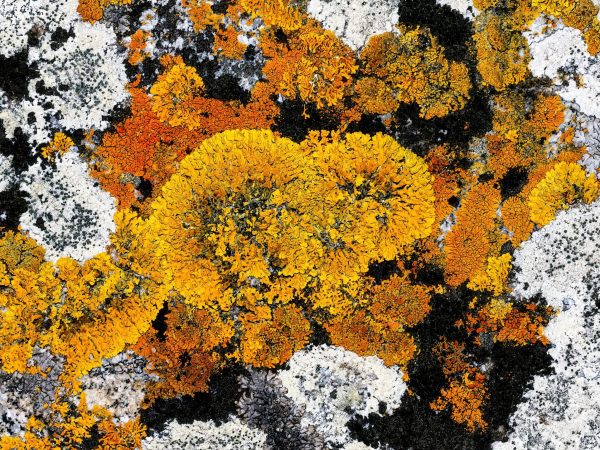We have come, dear Relatives,
as fruits for others’ nourishment.
As hummingbirds flutter in joy
and bears rest in awe,
so we dress with the colors of the rainbow
to weave us kin together.
In community circles
Mother Earth welcomes our songs.
Here we gather until we return to Her in service.
We come to stand by each other
to sing to each other
to let the chanting flow
for each other, our kin.
It is life holy who sends us.
We come to make kin here.
I grew up in El Paraiso Coelhá (Wonderland of Flowing Waters) in the heart of the cloud forest of Chiapas in southern Mexico. Coelhá was three-quarters forest, maize, and coffee beans, and one-quarter dreams. During the day, the sun released a scent of moistened glory, lucid greening, and effervescent dynamism. It was the time for action and expansion. Nighttime was more subtle, soothing, moonlit, calm. It was the time for the mysterious and for stories.
My grandma had the gift of balance. She received it from her grandma, who got it from her grandpa, who got it from the very roots of the Earth. They welcomed both rosy-fingered dawns and storms, the same. As medicine people, they listened to the wisdom of the trees, the chants of the wind, the whims of seasons’ breaks, the gossip of the birds. They tended the Earth with the kindest care, as should be done with the dwelling of the Ancestors. Their intimate and expansive senses were fluid, almost elemental. Through them, I learned to let go into the blackness of the Earth and open to the vast brightness of the skies. In the forestland, earthen caves, and starlit skies, I learned about flourishing1Allen, S. (2018). The Science of Gratitude. A white paper prepared for the John Templeton Foundation by the Greater Good Science Center at UC Berkeley. [online PDF]
Fredrickson, B. L., Cohn, M. A., Coffey, K. A., Pek, J., & Finkel, S. M. (2008). Open Hearts Build Lives: Positive Emotions, Induced Through Loving-Kindness Meditation, Build Consequential Personal Resources. Journal of Personality and Social Psychology, 95(5), 1045–1062. https://doi.org/10.1037/a0013262 [open-access version]
Bernstein, A., Vago, D. R., & Barnhofer, T. (2019). Understanding mindfulness, one moment at a time: An introduction to the special issue. Current Opinion in Psychology, 28, vi–x. https://doi.org/10.1016/j.copsyc.2019.08.001
Sturm, V. E., Datta, S., Roy, A. R. K., Sible, I. J., Kosik, E. L., Veziris, C. R., Chow, T. E., Morris, N. A., Neuhaus, J., Kramer, J. H., Miller, B. L., Holley, S. R., & Keltner, D. (2020). Big smile, small self: Awe walks promote prosocial positive emotions in older adults. Emotion. https://doi.org/10.1037/emo0000876 and the contemplative life.
They tended the Earth with the kindest care, as should be done with the dwelling of the Ancestors.
Contemplative studies have evolved into a robust field of inquiry across academic disciplines focusing on human flourishing. The appeal of the humanistic and scientific study of contemplation is encouraging and promising. Now, we see the field thriving in all facets of life and making remarkable progress, demonstrating how practices like awe, gratitude, mindfulness, and loving-kindness promote dimensions of flourishing for individuals.
Among the notable findings2Goyal, M., Singh, S., Sibinga, E. M. S., Gould, N. F., Rowland-Seymour, A., Sharma, R., Berger, Z., Sleicher, D., Maron, D. D., Shihab, H. M., Ranasinghe, P. D., Linn, S., Saha, S., Bass, E. B., & Haythornthwaite, J. A. (2014). Meditation Programs for Psychological Stress and Well-being: A Systematic Review and Meta-analysis. JAMA Internal Medicine, 174(3), 357–368. https://doi.org/10.1001/jamainternmed.2013.13018
Krittanawong, C., Kumar, A., Wang, Z., Narasimhan, B., Jneid, H., Virani, S. S., & Levine, G. N. (2020). Meditation and Cardiovascular Health in the US. The American Journal of Cardiology, 131, 23–26. https://doi.org/10.1016/j.amjcard.2020.06.043
Hill, P. C., Pargament, K. II., Hood, R. W., McCullough, Jr., Michael E., Swyers, J. P., Larson, D. B., & Zinnbauer, B. J. (2000). Conceptualizing Religion and Spirituality: Points of Commonality, Points of Departure. Journal for the Theory of Social Behaviour, 30(1), 51–77. https://doi.org/10.1111/1468-5914.00119
Miller, L. J. (2012). The Oxford Handbook of Psychology and Spirituality. Oxford University Press. http://dx.doi.org/10.1093/oxfordhb/9780199729920.001.0001
Koopmann-Holm, B., Sze, J., Jinpa, T., & Tsai, J. L. (2020). Compassion meditation increases optimism towards a transgressor. Cognition and Emotion, 34(5), 1028–1035. https://doi.org/10.1080/02699931.2019.1703648
Dahl, C. J., & Davidson, R. J. (2019). Mindfulness and the contemplative life: Pathways to connection, insight, and purpose. Current Opinion in Psychology, 28, 60–64. https://doi.org/10.1016/j.copsyc.2018.11.007
Bai, Y., Ocampo, J., Jin, G., Chen, S., Benet-Martinez, V., Monroy, M., Anderson, C., & Keltner, D. (2021). Awe, daily stress, and elevated life satisfaction. Journal of Personality and Social Psychology, 120(4), 837–860. https://doi.org/10.1037/pspa0000267 are reducing stress, improving cardiovascular health, spiritual growth, optimism, purpose, and overall life satisfaction. Contemplative studies are transforming culture, as evident in their integration into schools, health care settings, the judicial system, organizations, and government agencies, inspiring the promise3United Nations. (2015). Transforming our world: The 2030 Agenda for Sustainable Development. https://sdgs.un.org/2030agenda
of the 2030 Sustainable Development Agenda to “Leave no one behind”.
The Lightning and the Rainbow
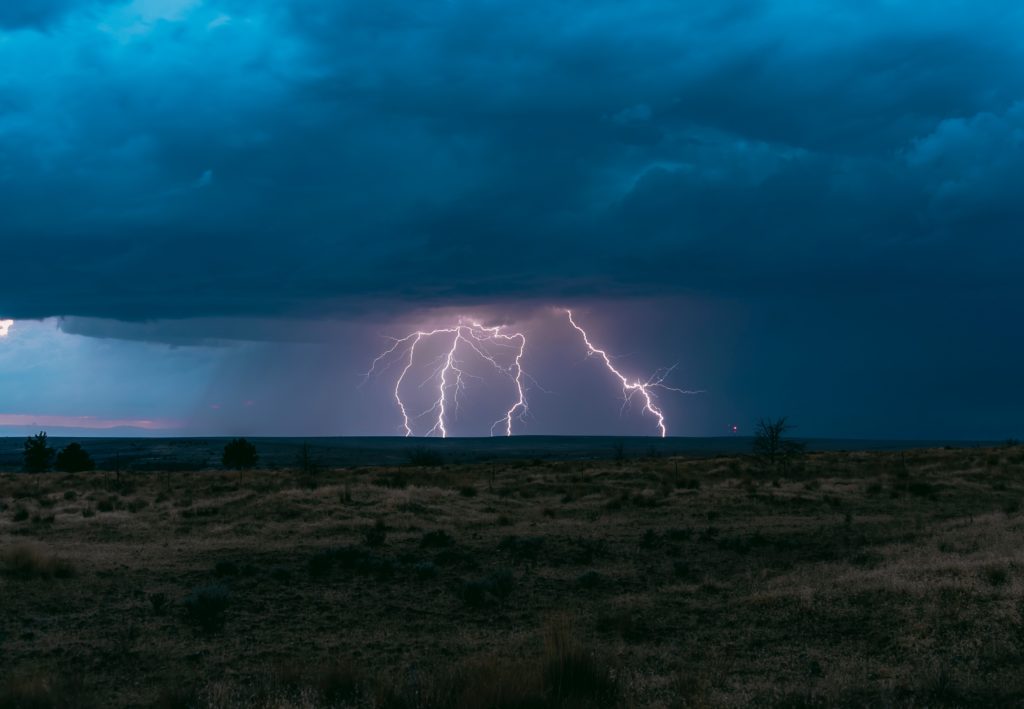
My family lineage would say that one key to contemplative living is accepting and adapting to the lightning and the rainbow. The pandemic was one of those symbolic bolts of lightning. It shed light on marginalization, historical structural discrimination, racial inequality, and exclusion at home and abroad. The human impact on the Earth became undeniable, as irrefutable as the need for compassion and caring relationships. In the past two years, impermanence became tangible. But just as palpable was the opportunity for reorientation, transformation, and regeneration.
Contemplative studies, with their interdisciplinary approach and emphasis on well-being, may offer crucial solutions 4Celidwen, Y. (2020a, May 29). Indigenous Contemplative Science: An Ethics of Belonging and Reconnection – The Center for Contemplative Mind in Society [Video]. https://www.contemplativemind.org/archives/5889 to our current social and environmental challenges. Realizing the relationships between events reorients our responses towards growing communal benefit. However, in attaining the rainbow of feasible solutions, it is imperative to welcome the lightning that exposes serious concerns within contemplative studies.
To date, empirical studies on contemplation have only represented a select variety of traditions, mainly from Western interpretations of secularized practices, texts, and principles from Buddhism, and to a much lesser degree, Hinduism and the Abrahamic traditions. Although the field has engaged with other contemplative traditions, these studies have been scarce. In other words, the field has indeed left some behind.
Grounded in Western individualism—and due partly to methodological and statistical issues—contemplative research has largely focused inward, on individuals’ physiological, emotional, and thought patterns, as well as outcomes around well-being and physical health. The documented benefits of contemplative practice have yet to include the development of a sense of community, social ethics, and spiritual growth. The recent attention to practices that focus on compassion, loving-kindness, and service reflect this need.5Ash, M., Harrison, T., Pinto, M., DiClemente, R., & Negi, L. T. (2021). A model for cognitively-based compassion training: Theoretical underpinnings and proposed mechanisms. Social Theory & Health, 19(1), 43–67. https://doi.org/10.1057/s41285-019-00124-x
Fredrickson, B. L., Boulton, A. J., Firestine, A. M., Van Cappellen, P., Algoe, S. B., Brantley, M. M., Kim, S. L., Brantley, J., & Salzberg, S. (2017). Positive Emotion Correlates of Meditation Practice: A Comparison of Mindfulness Meditation and Loving-kindness Meditation. Mindfulness, 8(6), 1623–1633. https://doi.org/10.1007/s12671-017-0735-9 [open-access version]
Moran, S., & Garcia, R. (2019). How does US college students’ sense of life purpose relate to their emotional expectations of being a volunteer in the community as part of a service-learning course? Bordón: Revista de Pedagogía, 71(3), 45–62. https://doi.org/10.13042/Bordon.2019.70425
Romero-Ramos, N., Romero-Ramos, Ó., & Suarez, A. J. G. (2021). Purpose in Life During COVID-19 Confinement: Effect of Physical Activity and Meditation. Polish Journal of Sport and Tourism, 28(2), 25–31. https://doi.org/doi:10.2478/pjst-2021-001
Another lightning bolt exposes the fact that the benefits of contemplative practices in the West have mainly been studied in (and made available to) White privileged audiences. This kind of appropriation perpetuates patterns of cognitive imperialism, racial injustice, and inequality.6Fleming, C. M., Womack, V. Y., & Proulx, J. (2022). Beyond White Mindfulness: Critical Perspectives on Racism, Well-being and Liberation. Taylor & Francis.
Battiste, M. (2017). Cognitive Imperialism. In M. A. Peters (Ed.), Encyclopedia of Educational Philosophy and Theory (pp. 183–188). Springer. https://doi.org/10.1007/978-981-287-588-4_501
Roth, H. (2008). Against Cognitive Imperialism: A Call for a Non-Ethnocentric Approach to Cognitive Science and Religious Studies. Religion East and West, 8, 1–26.
Chin, G.; Anyanso, V.; & Greeson, J. (2019). Addressing Diversity in Mindfulness Research on Health: A Narrative Review using the ADDRESSING Framework. Cooper Rowan Medical Journal, Vol. 1 : Iss. 1 , Article 2. http://dx.doi.org/10.31986/issn.2578-3343_vol1iss1.1.2 When imported from other cultures, contemplative approaches can lose the collectivist motivation and ethical pursuit of source traditions, often developing condescending narratives.7Thompson, E. (2020, January 10). Beyond Buddhist Exceptionalism. Yale University Press Blog. [blog post] In some contexts, there is a risk of spiritual by-passing,8Welwood, J. (1984). Principles of Inner Work: Psychological and Spiritual. The Journal of Transpersonal Psychology, 16(1), 63–73. [online PDF] spiritual consumerism, extractivism, capitalization of traditional practices, and the corporatization of contemplative traditions.9Celidwen, Y. (2021, November 21). Master Plants and Monster Medicine. Indigenous Contemplative and Western Medicine Practices: Towards Reciprocation and Recontextualization. Indigenous Religious Traditions. American Academy of Religion. [abstract]
LaRosa, J. (2019). $1.2 Billion U.S. Meditation Market Growing Strongly as It Becomes More Mainstream. [blog post]
Given the loneliness epidemic, climate crises, and the imperiling of biocultural diversity,10Loh, J., & Harmon, D. (2014). Biocultural Diversity: Threatened species, endangered languages. WWF Netherlands, Zeist, The Netherlands. [online report] the time could not be better for a piercing examination of these issues, and a reorientation of contemplative studies to include neglected traditions and relational/societal themes of flourishing. The inspiring growth of the field speaks to our need in this historical moment to develop collaborative solutions to repair the damage done to marginalized groups, and the Earth.
The Intergovernmental Panel on Climate Change (IPCC) warns that the unprecedented ecological crisis11Masson-Delmotte, V., Zhai, P., Pirani, A., Connors, S. L., Péan, C., Berger, S., Caud, N., Chen, Y., Goldfarb, L., Gomis, M. I., Huang, M., Leitzell, K., Lonnoy, E., Matthews, J. B. R., Maycock, T. K., Waterfield, T., Yelekçi, Ö., Yu, R., & Zhou, B. (Eds.). (2021). Climate Change 2021: The Physical Science Basis. Contribution of Working Group I to the Sixth Assessment Report of the Intergovernmental Panel on Climate Change. Cambridge University Press. https://www.ipcc.ch/report/ar6/wg1/
Pörtner, H.-O., Roberts, D. C., Tignor, M., Poloczanska, E. S., Mintenbeck, K., Alegría, A., Craig, M., Langsdorf, S., Löschke, S., Möller, V., Okem, A., & Rama, B. (2022). Impacts, Adaptation, and Vulnerability. Contribution of Working Group II to the Sixth Assessment Report of the Intergovernmental Panel on Climate Change. Cambridge University Press. https://www.ipcc.ch/report/ar6/wg2/ is increasing precipitously in all regions, with irreversible changes endangering life on Earth. These changes intensify adverse living conditions of all populations. At COP26, such urgency moved 141 leaders to commit to restoring12Glasgow Leaders’ Declaration on Forests and Land Use. (2021, November 2). UN Climate Change Conference (COP26) at the SEC – Glasgow 2021. https://ukcop26.org/glasgow-leaders-declaration-on-forests-and-land-use/ forested ecosystems. Flourishing has ceased to be a solely human ideal, and has become a global, environmental one.
Contemplative studies must also look to create innovative designs that promote well-being at a planetary level. Some of the emerging foci must turn toward societies and ecosystems that are bearing the brunt of physical changes in the climate, and the impact on the ecological health of human and other-than-human communities. Mounting research attests to the crucial role Indigenous Peoples13Food and Agriculture Organization (FAO) of the United Nations & Fund for the Development of Indigenous Peoples of Latin America and the Caribbean (FILAC) (2021). Forest governance by indigenous and tribal peoples. An opportunity for climate action in Latin America and the Caribbean. FAO. https://doi.org/10.4060/cb2953en
Fa, J. E., Watson, J. E., Leiper, I., Potapov, P., Evans, T. D., Burgess, N. D., Molnár, Z., Fernández-Llamazares, Á., Duncan, T., Wang, S., Austin, B. J., Jonas, H., Robinson, C. J., Malmer, P., Zander, K. K., Jackson, M. V., Ellis, E., Brondizio, E. S., & Garnett, S. T. (2020). Importance of Indigenous Peoples’ lands for the conservation of Intact Forest Landscapes. Frontiers in Ecology and the Environment, 18(3), 135–140. https://doi.org/10.1002/fee.2148
IPBES Secretariat. (2019, May 17). Global Assessment Report on Biodiversity and Ecosystem Services. IPBES Secretariat. https://www.ipbes.net/global-assessment can play in advancing climate solutions and the recovery of biocultural diversity. The rich contemplative practices of these traditions can enhance the reorientation towards planetary flourishing.
Indigenous peoples represent around 6% of the world’s population, and live within the most culturally diverse and enduring traditions. Indigenous lands and territories make up a third of land-protected areas, which contain almost 80% of remaining biodiversity.14Garnett, S. T., Burgess, N. D., Fa, J. E., Fernández-Llamazares, Á., Molnár, Z., Robinson, C. J., Watson, J. E. M., Zander, K. K., Austin, B., Brondizio, E. S., Collier, N. F., Duncan, T., Ellis, E., Geyle, H., Jackson, M. V., Jonas, H., Malmer, P., McGowan, B., Sivongxay, A., & Leiper, I. (2018). A spatial overview of the global importance of Indigenous lands for conservation. Nature Sustainability, 1(7), 369–374. https://doi.org/10.1038/s41893-018-0100-6
Sobrevila, C. (2008). The Role of Indigenous Peoples in Biodiversity Conservation. [online report] Indigenous cultures have shown extraordinary resilience against genocide and cultural and environmental destruction, as they have continued to transmit traditional wisdom, ancestral lineages, institutions, ways of knowing, beliefs, history, and spirituality through generations.
As the Indigenous approach is not solely focused on the individual experience but on relationships belonging to an ecosystem, … it shifts the core focus from an ego to an eco identity.
For Indigenous Peoples, who widely live in environments harshly threatened by the climate crisis and biocultural loss, learning to understand Nature is a matter of survival. My Ancestors infused my early childhood experiences with a relational identity that views the ecosystem as kin. I have found a very similar ethos guiding Indigenous Nations around the globe—while these traditions are widely diverse in tribal identity, representation, ways of knowing, and being, we share contemplative perspectives about caring for relationships and our environment. This kindred approach reveals a responsive system of belonging, imbued with reverence, awe, responsibility, and a sense of sacred interactions. We recently joined voices from around the world, resulting in a consensus15Redvers, N., Celidwen, Y., Schultz, C., Horn, O., Githaiga, C., Vera, M., Perdrisat, M., Plume, L. M., Kobei, D., Kain, M. C., Poelina, A., Rojas, J. N., & Blondin, B. (2022). The determinants of planetary health: An Indigenous consensus perspective. The Lancet Planetary Health, 6(2), e156–e163. https://doi.org/10.1016/S2542-5196(21)00354-5 paper describing these shared perspectives about the interwoven patterns that result in planetary health.
Integrating Indigenous and Western Science
I hope that my own work can be another way of shining light on what we may not want to see. To encourage decolonization of the settler-colonial lens that has historically excluded Indigenous Peoples and our knowledge systems, my research attempts to reclaim this space within contemplative studies. Specifically, I bridge Indigenous and Western sciences and methodologies in what I have called an “Indigenous contemplative science.” This innovative approach involves a culturally-sensitive knowledge-translation system of collaboration and complementation that can be profoundly impactful and timely for the challenges we face today.
Indigenous traditions have been tested and refined for millennia through traditional ecological knowledge16Berkes, F. (2009). Indigenous ways of knowing and the study of environmental change. Journal of the Royal Society of New Zealand, 39(4), 151–156. https://doi.org/10.1080/03014220909510568
Nelson, M. K., Shilling, D. (2018). Traditional ecological knowledge: Learning from indigenous practices for environmental sustainability. https://doi.org/10.1017/9781108552998 for their benefits at the physical, psychological, relational, and ecological levels. My theory on the core focus of Indigenous contemplation is the coherence of narratives, the integration of the community into ecosystems, and the consistency of social relations. My thesis of an “ethics of belonging” involves rigorous qualitative analysis (observation, theorizing, and testing) of empirical experience and phenomena distilled in contemplative storytelling, ritual, and ceremonial practices.


Contemplative studies recognize third-person and critical first-person approaches and validate direct experience. Importantly, Indigenous contemplative practices introduce a second-person relational aspect through narrative, shared ritual, and ceremony as ways of inquiry. As the Indigenous approach is not solely focused on the individual experience but on relationships belonging to an ecosystem, I have argued that it shifts the core focus from an ego to an eco identity.
Indigenous peoples understand ourselves as interdependent, so the perception of self and world is based on responsibility to the environmental community. Indigenous contemplative practices reorient the focus to the larger systems of relationships that humans are only part of, bringing equal emphasis to self, community, and environment through keen awareness of relational networks.
In welcoming the rainbow of opportunities, Indigenous contemplative science offers new insights into the meaning and pathways to sustainable, collective well-being by promoting a sense of relationality and belonging,17Celidwen, Y. (2020b, November 6). Rising the Feathered Serpent: Establishing a Conversation on Indigenous Contemplative Traditions (conference abstract). Mind & Life Contemplative Research Conference. https://www.mindandlife.org/event/2020-contemplative-research-conference/ self-awareness, and social and environmental skills. It does this in two ways, through what I call kin relationality and ecological belonging (see below), neither of which have traditionally been included in the study of contemplative interventions and flourishing.
Pathways to Sustainable Well-being
Below are two pathways toward sustainable, collective well-being rooted in Indigenous contemplative science.
Kin relationality entails the qualities of interdependence, mutuality, organization, belonging, purpose, and meaning inherent in each being and phenomenon. Living and cultural forms are interrelated in patterns of mutual influence. For example, Indigenous perspectives worldwide share remarkably similar views in conceiving the Earth as a Mother and all creation as kin. Contemplative practices within Indigenous traditions cultivate awareness and orientation of kin relationality vis-a-vis all beings and phenomena, and engender gratitude, awe, responsibility, and reverence.
Ecological belonging is the realization of being part of the collective Earth system, or an awareness of being part of ecosystems and life cycles. It manifests as an Earth-based group identity through affective (compassion), cognitive (acknowledgment), volitive (responsibility), and motivational (stewardship) engagement towards life forms and the natural world. Consequently, from an Indigenous perspective, any person’s flourishing depends on environmental well-being. There is no human flourishing without Mother Earth flourishing.
These practices focus on prosocial acts and Indigenous Earth ethics that arise from actively engaging with the environment. Through these two core focuses, Indigenous contemplative science addresses two critical crises of today: the breakdown of community and resulting rise in loneliness, and the climate crisis. The integration of Indigenous methodologies and Western empirical research envisions scalable, culturally sensitive, and inclusive approaches to planetary flourishing. I believe these practices will enable millions in Indigenous and non-Indigenous societies to understand inter-subjective kin relationality and help the Earth’s restoration, conservation, and sustainability.
By amplifying and centering the marginalized voices of Indigenous Peoples, my work brings prominence to their contemplative insights as mediators of knowledge systems that respond to today’s challenges.
A critical note regarding working with Indigenous traditions: I have pointed at the perpetuation of appropriation, exploitation, extraction, and capitalization of Indigenous practices in Western research (e.g., psychedelic research and psychedelic-assisted therapies), which carry devastating consequences to Indigenous Nations. My work on Indigenous contemplative science follows strict Indigenous protocols of proper and respectful approach and dissemination of practices. I have worked closely with local traditional Elders and knowledge-holders who have granted access to the most relevant practices of their region for communal planetary benefit without infringing on culturally-sensitive aspects. Together, we have oriented this research towards a new generation of collaborative work on equal standing with the West respecting the ethical principles of acknowledgment, knowledge-translation, benefit-sharing, and belonging ethical principles.
Toward Flourishing
Research speaks to the promise of promoting kin relationality and ecological belonging. The more deeply relational contemplative practices are (e.g., loving-kindness and gratitude), the more powerfully they produce a suite of benefits18Pressman, S. D., Jenkins, B. N., & Moskowitz, J. T. (2019). Positive affect and health: What do we know and where next should we go?. Annual Review of Psychology, 70, 627-650. https://doi.org/10.1146/annurev-psych-010418-102955 for the mind and body of self and others. Immersion with the natural environment has proved to be one of the most robust predictors19Kuo, M. (2015). How might contact with nature promote human health? Promising mechanisms and a possible central pathway. Frontiers in Psychology – Cognitive Science. https://doi.org/10.3389/fpsyg.2015.01093 of enhanced physical health, subjective well-being, and prosocial, community-enhancing behavior. More specifically, research suggests20Yu, C.-P., Lin, C.-M., Tsai, M.-J., Tsai, Y.-C., & Chen, C.-Y. (2017). Effects of Short Forest Bathing Program on Autonomic Nervous System Activity and Mood States in Middle-Aged and Elderly Individuals. International Journal of Environmental Research and Public Health, 14(8), 897. https://doi.org/10.3390/ijerph14080897
Lee, J., Park, B.-J., Tsunetsugu, Y., Ohira, T., Kagawa, T., & Miyazaki, Y. (2011). Effect of forest bathing on physiological and psychological responses in young Japanese male subjects. Public Health, 125(2), 93–100. https://doi.org/10.1016/j.puhe.2010.09.005
Li, Q. (2010). Effect of forest bathing trips on human immune function. Environmental Health and Preventive Medicine, 15(1), 9–17. https://doi.org/10.1007/s12199-008-0068-3 that interrelating with the natural environment increases parasympathetic activity, promotes stress relief, and enhances immune system function.
Indigenous practices benefit multiple dimensions of planetary flourishing towards better relationality and enhanced environmental stewardship. I encourage a broader discourse around these two foundational aspects of Indigenous traditions through large Indigenous and non-Indigenous networks. More importantly, the fruits of this approach are shared back with the source traditions and with the community at large. By advancing the study of kin relationality and ecological belonging, I hope to broaden and strengthen our understanding of contemplation and planetary flourishing, and how contemplative studies can enable our world to meet our times’ mental health and natural crises.
By amplifying and centering the marginalized voices of Indigenous Peoples, my work brings prominence to their contemplative insights as mediators of knowledge systems that respond to today’s challenges. By advancing Indigenous contemplative science, contemplative studies will also be taking steps towards the reparation of the historical-cultural genocide and erasure committed against Indigenous Peoples over the past 500 years, whose wisdom now may be critical for the survival of life.
May the guiding voice of Mother Earth, representing all beings of all directions’ expanse of earth, water, air, fire, and space, grant us the nourishment of body, mind, heart, and spirit to serve Her well.
May we vow to honor, respect, and tend to the Lands of our Ancestors and the welcoming Lands we call home.
May we acknowledge the beings in these lands as Our Kin.
May we acknowledge and deeply bow to the rightful stewards of these Lands and wholeheartedly recognize our human and other-than-human relatives displaced and dispossessed of homes and identities.
May we become the flourishing garden for all to call home.
This essay first appeared in Insights: Journey into the Heart of Contemplative Science and is reproduced with permission from the Mind & Life Institute.
References
- 1Allen, S. (2018). The Science of Gratitude. A white paper prepared for the John Templeton Foundation by the Greater Good Science Center at UC Berkeley. [online PDF]
Fredrickson, B. L., Cohn, M. A., Coffey, K. A., Pek, J., & Finkel, S. M. (2008). Open Hearts Build Lives: Positive Emotions, Induced Through Loving-Kindness Meditation, Build Consequential Personal Resources. Journal of Personality and Social Psychology, 95(5), 1045–1062. https://doi.org/10.1037/a0013262 [open-access version]
Bernstein, A., Vago, D. R., & Barnhofer, T. (2019). Understanding mindfulness, one moment at a time: An introduction to the special issue. Current Opinion in Psychology, 28, vi–x. https://doi.org/10.1016/j.copsyc.2019.08.001
Sturm, V. E., Datta, S., Roy, A. R. K., Sible, I. J., Kosik, E. L., Veziris, C. R., Chow, T. E., Morris, N. A., Neuhaus, J., Kramer, J. H., Miller, B. L., Holley, S. R., & Keltner, D. (2020). Big smile, small self: Awe walks promote prosocial positive emotions in older adults. Emotion. https://doi.org/10.1037/emo0000876 - 2Goyal, M., Singh, S., Sibinga, E. M. S., Gould, N. F., Rowland-Seymour, A., Sharma, R., Berger, Z., Sleicher, D., Maron, D. D., Shihab, H. M., Ranasinghe, P. D., Linn, S., Saha, S., Bass, E. B., & Haythornthwaite, J. A. (2014). Meditation Programs for Psychological Stress and Well-being: A Systematic Review and Meta-analysis. JAMA Internal Medicine, 174(3), 357–368. https://doi.org/10.1001/jamainternmed.2013.13018
Krittanawong, C., Kumar, A., Wang, Z., Narasimhan, B., Jneid, H., Virani, S. S., & Levine, G. N. (2020). Meditation and Cardiovascular Health in the US. The American Journal of Cardiology, 131, 23–26. https://doi.org/10.1016/j.amjcard.2020.06.043
Hill, P. C., Pargament, K. II., Hood, R. W., McCullough, Jr., Michael E., Swyers, J. P., Larson, D. B., & Zinnbauer, B. J. (2000). Conceptualizing Religion and Spirituality: Points of Commonality, Points of Departure. Journal for the Theory of Social Behaviour, 30(1), 51–77. https://doi.org/10.1111/1468-5914.00119
Miller, L. J. (2012). The Oxford Handbook of Psychology and Spirituality. Oxford University Press. http://dx.doi.org/10.1093/oxfordhb/9780199729920.001.0001
Koopmann-Holm, B., Sze, J., Jinpa, T., & Tsai, J. L. (2020). Compassion meditation increases optimism towards a transgressor. Cognition and Emotion, 34(5), 1028–1035. https://doi.org/10.1080/02699931.2019.1703648
Dahl, C. J., & Davidson, R. J. (2019). Mindfulness and the contemplative life: Pathways to connection, insight, and purpose. Current Opinion in Psychology, 28, 60–64. https://doi.org/10.1016/j.copsyc.2018.11.007
Bai, Y., Ocampo, J., Jin, G., Chen, S., Benet-Martinez, V., Monroy, M., Anderson, C., & Keltner, D. (2021). Awe, daily stress, and elevated life satisfaction. Journal of Personality and Social Psychology, 120(4), 837–860. https://doi.org/10.1037/pspa0000267 - 3United Nations. (2015). Transforming our world: The 2030 Agenda for Sustainable Development. https://sdgs.un.org/2030agenda
- 4Celidwen, Y. (2020a, May 29). Indigenous Contemplative Science: An Ethics of Belonging and Reconnection – The Center for Contemplative Mind in Society [Video]. https://www.contemplativemind.org/archives/5889
- 5Ash, M., Harrison, T., Pinto, M., DiClemente, R., & Negi, L. T. (2021). A model for cognitively-based compassion training: Theoretical underpinnings and proposed mechanisms. Social Theory & Health, 19(1), 43–67. https://doi.org/10.1057/s41285-019-00124-x
Fredrickson, B. L., Boulton, A. J., Firestine, A. M., Van Cappellen, P., Algoe, S. B., Brantley, M. M., Kim, S. L., Brantley, J., & Salzberg, S. (2017). Positive Emotion Correlates of Meditation Practice: A Comparison of Mindfulness Meditation and Loving-kindness Meditation. Mindfulness, 8(6), 1623–1633. https://doi.org/10.1007/s12671-017-0735-9 [open-access version]
Moran, S., & Garcia, R. (2019). How does US college students’ sense of life purpose relate to their emotional expectations of being a volunteer in the community as part of a service-learning course? Bordón: Revista de Pedagogía, 71(3), 45–62. https://doi.org/10.13042/Bordon.2019.70425
Romero-Ramos, N., Romero-Ramos, Ó., & Suarez, A. J. G. (2021). Purpose in Life During COVID-19 Confinement: Effect of Physical Activity and Meditation. Polish Journal of Sport and Tourism, 28(2), 25–31. https://doi.org/doi:10.2478/pjst-2021-001 - 6Fleming, C. M., Womack, V. Y., & Proulx, J. (2022). Beyond White Mindfulness: Critical Perspectives on Racism, Well-being and Liberation. Taylor & Francis.
Battiste, M. (2017). Cognitive Imperialism. In M. A. Peters (Ed.), Encyclopedia of Educational Philosophy and Theory (pp. 183–188). Springer. https://doi.org/10.1007/978-981-287-588-4_501
Roth, H. (2008). Against Cognitive Imperialism: A Call for a Non-Ethnocentric Approach to Cognitive Science and Religious Studies. Religion East and West, 8, 1–26.
Chin, G.; Anyanso, V.; & Greeson, J. (2019). Addressing Diversity in Mindfulness Research on Health: A Narrative Review using the ADDRESSING Framework. Cooper Rowan Medical Journal, Vol. 1 : Iss. 1 , Article 2. http://dx.doi.org/10.31986/issn.2578-3343_vol1iss1.1.2 - 7Thompson, E. (2020, January 10). Beyond Buddhist Exceptionalism. Yale University Press Blog. [blog post]
- 8Welwood, J. (1984). Principles of Inner Work: Psychological and Spiritual. The Journal of Transpersonal Psychology, 16(1), 63–73. [online PDF]
- 9Celidwen, Y. (2021, November 21). Master Plants and Monster Medicine. Indigenous Contemplative and Western Medicine Practices: Towards Reciprocation and Recontextualization. Indigenous Religious Traditions. American Academy of Religion. [abstract]
LaRosa, J. (2019). $1.2 Billion U.S. Meditation Market Growing Strongly as It Becomes More Mainstream. [blog post] - 10Loh, J., & Harmon, D. (2014). Biocultural Diversity: Threatened species, endangered languages. WWF Netherlands, Zeist, The Netherlands. [online report]
- 11Masson-Delmotte, V., Zhai, P., Pirani, A., Connors, S. L., Péan, C., Berger, S., Caud, N., Chen, Y., Goldfarb, L., Gomis, M. I., Huang, M., Leitzell, K., Lonnoy, E., Matthews, J. B. R., Maycock, T. K., Waterfield, T., Yelekçi, Ö., Yu, R., & Zhou, B. (Eds.). (2021). Climate Change 2021: The Physical Science Basis. Contribution of Working Group I to the Sixth Assessment Report of the Intergovernmental Panel on Climate Change. Cambridge University Press. https://www.ipcc.ch/report/ar6/wg1/
Pörtner, H.-O., Roberts, D. C., Tignor, M., Poloczanska, E. S., Mintenbeck, K., Alegría, A., Craig, M., Langsdorf, S., Löschke, S., Möller, V., Okem, A., & Rama, B. (2022). Impacts, Adaptation, and Vulnerability. Contribution of Working Group II to the Sixth Assessment Report of the Intergovernmental Panel on Climate Change. Cambridge University Press. https://www.ipcc.ch/report/ar6/wg2/ - 12Glasgow Leaders’ Declaration on Forests and Land Use. (2021, November 2). UN Climate Change Conference (COP26) at the SEC – Glasgow 2021. https://ukcop26.org/glasgow-leaders-declaration-on-forests-and-land-use/
- 13Food and Agriculture Organization (FAO) of the United Nations & Fund for the Development of Indigenous Peoples of Latin America and the Caribbean (FILAC) (2021). Forest governance by indigenous and tribal peoples. An opportunity for climate action in Latin America and the Caribbean. FAO. https://doi.org/10.4060/cb2953en
Fa, J. E., Watson, J. E., Leiper, I., Potapov, P., Evans, T. D., Burgess, N. D., Molnár, Z., Fernández-Llamazares, Á., Duncan, T., Wang, S., Austin, B. J., Jonas, H., Robinson, C. J., Malmer, P., Zander, K. K., Jackson, M. V., Ellis, E., Brondizio, E. S., & Garnett, S. T. (2020). Importance of Indigenous Peoples’ lands for the conservation of Intact Forest Landscapes. Frontiers in Ecology and the Environment, 18(3), 135–140. https://doi.org/10.1002/fee.2148
IPBES Secretariat. (2019, May 17). Global Assessment Report on Biodiversity and Ecosystem Services. IPBES Secretariat. https://www.ipbes.net/global-assessment - 14Garnett, S. T., Burgess, N. D., Fa, J. E., Fernández-Llamazares, Á., Molnár, Z., Robinson, C. J., Watson, J. E. M., Zander, K. K., Austin, B., Brondizio, E. S., Collier, N. F., Duncan, T., Ellis, E., Geyle, H., Jackson, M. V., Jonas, H., Malmer, P., McGowan, B., Sivongxay, A., & Leiper, I. (2018). A spatial overview of the global importance of Indigenous lands for conservation. Nature Sustainability, 1(7), 369–374. https://doi.org/10.1038/s41893-018-0100-6
Sobrevila, C. (2008). The Role of Indigenous Peoples in Biodiversity Conservation. [online report] - 15Redvers, N., Celidwen, Y., Schultz, C., Horn, O., Githaiga, C., Vera, M., Perdrisat, M., Plume, L. M., Kobei, D., Kain, M. C., Poelina, A., Rojas, J. N., & Blondin, B. (2022). The determinants of planetary health: An Indigenous consensus perspective. The Lancet Planetary Health, 6(2), e156–e163. https://doi.org/10.1016/S2542-5196(21)00354-5
- 16Berkes, F. (2009). Indigenous ways of knowing and the study of environmental change. Journal of the Royal Society of New Zealand, 39(4), 151–156. https://doi.org/10.1080/03014220909510568
Nelson, M. K., Shilling, D. (2018). Traditional ecological knowledge: Learning from indigenous practices for environmental sustainability. https://doi.org/10.1017/9781108552998 - 17Celidwen, Y. (2020b, November 6). Rising the Feathered Serpent: Establishing a Conversation on Indigenous Contemplative Traditions (conference abstract). Mind & Life Contemplative Research Conference. https://www.mindandlife.org/event/2020-contemplative-research-conference/
- 18Pressman, S. D., Jenkins, B. N., & Moskowitz, J. T. (2019). Positive affect and health: What do we know and where next should we go?. Annual Review of Psychology, 70, 627-650. https://doi.org/10.1146/annurev-psych-010418-102955
- 19Kuo, M. (2015). How might contact with nature promote human health? Promising mechanisms and a possible central pathway. Frontiers in Psychology – Cognitive Science. https://doi.org/10.3389/fpsyg.2015.01093
- 20Yu, C.-P., Lin, C.-M., Tsai, M.-J., Tsai, Y.-C., & Chen, C.-Y. (2017). Effects of Short Forest Bathing Program on Autonomic Nervous System Activity and Mood States in Middle-Aged and Elderly Individuals. International Journal of Environmental Research and Public Health, 14(8), 897. https://doi.org/10.3390/ijerph14080897
Lee, J., Park, B.-J., Tsunetsugu, Y., Ohira, T., Kagawa, T., & Miyazaki, Y. (2011). Effect of forest bathing on physiological and psychological responses in young Japanese male subjects. Public Health, 125(2), 93–100. https://doi.org/10.1016/j.puhe.2010.09.005
Li, Q. (2010). Effect of forest bathing trips on human immune function. Environmental Health and Preventive Medicine, 15(1), 9–17. https://doi.org/10.1007/s12199-008-0068-3

